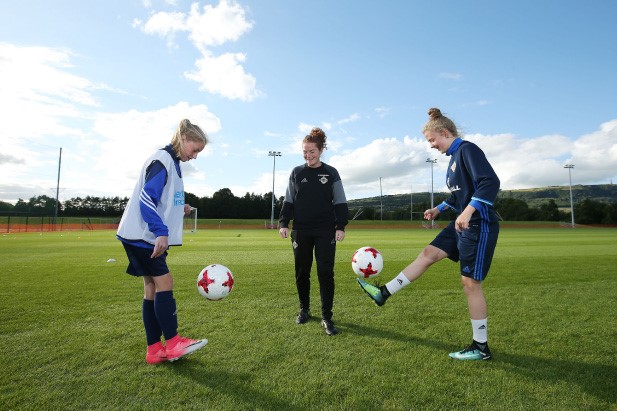Today’s kids average seven hours daily in front of electronics, such as television, tablets, laptops and phones. There’s no denying what the statistics show — today’s kids are swapping active, outdoor play for a more sedentary lifestyle, causing severe consequences for their health and overall well-being.
If you’re like most parents, you probably already knew your kids tend to devote more waking hours to “screen time” than they do to outdoor play. The decline in active kids is an increased focus of influential people and media outlets, most recently by former First Lady Michelle Obama in her “Let’s Move!” campaign. But, while most parents recognize their kids aren’t moving enough during the day, some aren’t sure why it’s so crucial.
Most parents would agree they want their kids to be physically healthy, well-rounded, independent and compassionate individuals. What if we told you the best way to instill these qualities in your kids was to inspire them to spend more time outside?
Encouraging children to spend more time in the outdoors and away from technology aids their physical well-being, and helps them improve their emotional and intellectual health, too. Whether it’s a trip to a nature-inspired park or taking a hike through the woods with their family, there’s no denying the benefits of stepping away from the screen and into the sunshine.
Read the full article or jump to a specific section:
Physical Development Benefits of Outdoor Play
The benefits of outdoor play for children’s development are extensive, both in early childhood and the school-age years. Outdoor play directly impacts a child’s weight, physical strength and ability to fight off illness. Kids who spend a lot of active time outdoors in their early years generally continue to exercise more regularly as they age.
Encouraging outdoor play in young children helps develop a healthy attitude about maintaining an energetic adult lifestyle.
When compared with their peers, kids who spend more time outdoors typically exhibit the following attributes.
1. Improved Motor Skills
Outdoor play leaves kids with more advanced motor skills than their “indoor” peers, including coordination, balance and agility. Kids who play outside are more likely to move in ways that challenge their muscles, bones and physical endurance. When children are outside, they have the space to run, walk, jump, swing and throw. They can play catch. They can crawl under bushes, climb trees and ride bikes.
When you allow kids to practice their physical abilities, they strengthen their bodies and become more confident in their capabilities. For kids who are athletes, extended time outdoors can also offer the opportunity and space to practice skills like batting, kicking and catching — whichever they need for the sports they’re learning.
2. Lower Body Mass Index
In 1980, just 7% of kids met the criteria for obesity. Three decades later, studies found upwards of one in three kids could fall under the obesity classification. The culprit of this dramatic rise in childhood obesity is twofold — Americans are eating more and spending less time being active.
Kids who spend more time playing outside are less likely to be obese because they are so energetic. They’re away from the television or computer screen. They’re running, jumping, climbing and generally burning more calories than their sedentary counterparts.
One study of preschool-aged children showed a direct correlation between a child’s body mass index and the amount of time they are active outside. The longer the child’s parents or guardians allowed them to play outdoors, the lower their BMI. Other studies show kids with close friends who also enjoy playing outdoors are more likely to spend time outside. Therefore, encouraging kids to choose active friends can also benefit them.
3. Improved Overall Health
Limiting a child’s risk of becoming obese has many long-term health implications. Obese kids are at higher risk for problems like cardiovascular disease, asthma, diabetes and sleep apnea. And, exposure to sunlight improves moods and strengthens immune systems. Outdoor play also helps children with ADHD by giving them an outlet for the activity and energy that often create issues indoors.
4. Improved Muscle Strength
When you’re pushing your child in a swing, all their muscles become engaged as they figure out how to hold on, sit up and follow the swing’s movement. Though most parents think of swinging as a repetitive, monotonous playground activity, it helps young children develop muscle strength. Outdoor toys like scooters, bikes and even skateboards require your child to engage and strengthen various muscle systems, as well.
Social Development Benefits
While there are many physical benefits to outdoor play, it also provides a remarkable opportunity for social development in children. Consider these notable advantages.
1. Increased Openness With Parents and Caregivers
When kids are indoors, they are often in smaller spaces and competing with other children, such as schoolmates or siblings, for attention. It can get loud and overwhelming, which often causes kids — especially younger ones — to get intimidated and increasingly quiet. That can prevent them from opening up and sharing with their caregivers.
When kids spend time outside, they generally feel less overwhelmed because they are not cooped up and vying with others. This feeling of having the physical space to move and breathe often results in a child being more willing to open up and talk about things with their parent or caregiver.
2. Greater Self-Awareness
Children who play outside are more likely to develop observational and reasoning skills. Playground activities, like swinging, have many physical benefits for kids. Being outdoors also lets them explore the world from a different perspective. It shows them how to be aware of the space they’re in and understand the concept of “cause and effect” as they see what happens when a grownup pushes them on a swing.
3. Appreciation for the Environment
In one study, 87% of individuals who spent time outside as children carried a love of nature into their adult years. Of those same people, 84% said they still considered the environment a priority.
The reason for this is simple — by spending a lot of time outside, children learn to appreciate the environment because they have firsthand knowledge of plants and animals.
They’ve watched squirrels chasing each other up a tree. They’ve witnessed a sunset. They’ve caught ladybugs. They’ve planted flowers, climbed trees and explored parks. As they grow, their fond memories of their childhood experiences lead them to more awareness and compassion. They feel motivated to preserve the spaces they loved as children because they’ve experienced the value.
4. Improved Peer-to-Peer Relationships
Kids who play outside are more self-aware, and their awareness of others and their feelings also increase. Studies show that kids who play outdoors are less likely to bully other children.
Outdoor play often requires imagination and teamwork, which helps children have positive interactions with each other. That doesn’t mean there won’t be arguments over whose turn it is to go down the slide or shoot a basket. But, in general, kids who consistently play outdoors are more likely to get along with their peers and find common ground.
Of course, it doesn’t hurt that soaking up all that sunshine improves their moods. It’s harder to be angry at someone when you’re in a good mood!
Emotional Development Benefits
Along with the social and physical benefits of outdoor play, children who play outside tend to be stronger emotionally and process things more easily than children who don’t get ample opportunities to play outside.
1. Use of All Five Senses
Preschoolers who watch a lot of TV are only using two of their senses — sight and hearing. That can severely limit their ability to process and respond to sensory stimuli they encounter as they grow. On the other hand, children who play outside engage more of their senses by exploring the outdoors — perhaps even taste, as they catch snowflakes or raindrops on their tongues.
For younger children, this familiarizes them with various sensory experiences, so they can process them better as they continue to grow and develop.
2. Develop a Sense of Independence
Being outside has proven to help children develop their sense of independence. Even though a parent is usually close by, children feel a sense of freedom when they’re at the park that they don’t experience elsewhere.
They get the chance to explore and take limited risks without feeling like an adult is breathing down their neck, invent games with their friends, explore their boundaries and figure out what they’re capable of doing. The confidence that results from this will help them as they continue to learn and grow.
They can try tasks and activities they wouldn’t be able to do inside and apply problem-solving strategies to questions like, “Can I climb across those monkey bars?” or, “Can I reach that net if I jump high enough?”
Intellectual Development Benefits
Many parents think the best way to develop their child’s intellectual abilities is to spend more time learning in an organized classroom environment. But, did you know encouraging your child to spend time outside is also a great way to develop their intellectual abilities? Outdoor play has the following crucial advantages.
1. Aid With Brain Development
When kids are running around outside, they are inventing games, exploring the world around them and experiencing feelings of independence. Besides developing this autonomy, they also cultivate their organizational abilities and decision-making skills as they work individually and with their peers to create games, solve problems and implement their ideas and solutions. As kids play, they also learn more about the importance of creating and following rules.
2. Improve Communication Skills
When they’re on the playground or at a park, kids have many opportunities to meet other children and cultivate friendships with them. They meet people who are different from them and develop the skills they need to play successfully with many different children.
While parents do facilitate this to a degree — especially if they arrange playdates with friends to meet up in an outdoor space — playgrounds and other common outdoor spaces allow children the space they need to practice meeting and developing friendships independently.
3. Expanded Learning Space
Putting educational toys and materials outdoors gives kids a chance to learn new information and skills by playing. It also shows kids they can learn anywhere, not just in classrooms and indoor learning spaces. For example, as they keep score during games, they strengthen their ability to count and learn about relationships between numbers as the score increases.
Importance of Outdoor Play for Younger vs. Older Children
Kids play differently at various life stages. You can’t expect a 2-year-old to play the same way as a 6- or 8-year-old. But, even though they’ll show different interests depending on their developmental stage, children of all ages can benefit from outdoor play. That’s true for children in their younger years and as they grow into adulthood.
Between the ages of birth and 2 years old, children have limits to what they can do outside, but that doesn’t mean they shouldn’t have the opportunity. At that young age, most kids will explore or play alone, developing their senses and acclimating to what’s around them. Around 2 years old, parents may see their child observing older kids at play, though they will most likely still prefer independent play. You may also notice your child progresses from observing other children to choosing to play nearby.
Once kids move into the preschool phase at 3 to 4 years old, they will begin to show signs of interacting, though it will still be minimal. You’ll notice a group of kids may all be playing on a jungle gym, but one will be on the slide, while one is climbing a ladder and another is doing something else. Then, once kids enter school, you’ll notice much more of a tendency to play games and organize activities together, such as hide-and-seek and other outdoor activities.
While outdoor play looks different as children grow and change, parents must remember all outdoor activity is beneficial to children. While a 1-year-old may not be able to swing on monkey bars or slide down a slide alone, they are learning a slide feels smooth, sunshine is bright and birds live in the trees around the park where you go to explore.
How Can You Encourage Your Child to Play Outside?
Whether your child is 2 or 12, it’s vital to encourage them to spend time away from the screen enjoying the outdoors. Exploring parks and playgrounds can be the way to help your kids enjoy being outside, whether they’re playing alone or with their friends.
Here are some ways you can encourage your child to play outside.
1. Make It Fun
Children won’t want to go outside if they think it’s boring. Spark your child’s imagination by providing them with fun things to do, like:
- Playing basketball.
- Playing catch.
- Hunting for treasure.
- Going on a scavenger hunt.
- Visiting the local playground.
Many children find enjoyment in technology. While there are many benefits of technology use in children, there are equal — if not more — benefits in outdoor play. Making the outdoors seem entertaining encourages children to leave their technology behind and enjoy their time in nature.
2. Take Them Places
Sometimes, the confinements of your backyard or neighborhood can put physical boundaries on your child’s imagination. Make outdoor play seem like a memorable event by taking your child places, like the community playground.
Children benefit from playground adventures, as well as other community outdoor play areas, in ways like:
- Learning how to collaborate and play with other children.
- Gaining independence.
- Experiencing a new range of emotions.
- Building confidence and self-esteem.
3. Provide Options
Boredom is healthy for children’s development. It allows children to explore their environment more. When your child comes to you and complains of boredom, remind them of their options. Some things you can encourage your child to do when they say they’re bored are:
- Bring outdoor toys.
- Try unfamiliar playground equipment.
- Play board games or education games outside.
Giving children options — especially outdoor play activities — empowers them to break mental boundaries and discover passions they’ve yet to discover.
4. Bring Family and Friends
Make outdoor play more exciting and beneficial by bringing family and friends into the picture. As mentioned, children benefit from playing outdoors with their peers. Engaging in outdoor play with your child hones the following skills:
- Motor skills.
- Emotion regulation.
- Group leadership skills.
- Creativity.
- Cognitive flexibility.
Invite friends and family over to your house for some outdoor fun, like hosting an outdoor game night or a competitive relay race. Or, take the excitement elsewhere, like at your community park or playground.
5. Go Outside Regularly
It’s human nature to find comfort in familiar routines. When things are predictable, children are more confident to try new things.
Make going outside a regular activity within your family. Schedule a time for your children to go outdoors, like after school. Or, consider visiting the playground every weekend. Find what your child enjoys and stick to it.



















